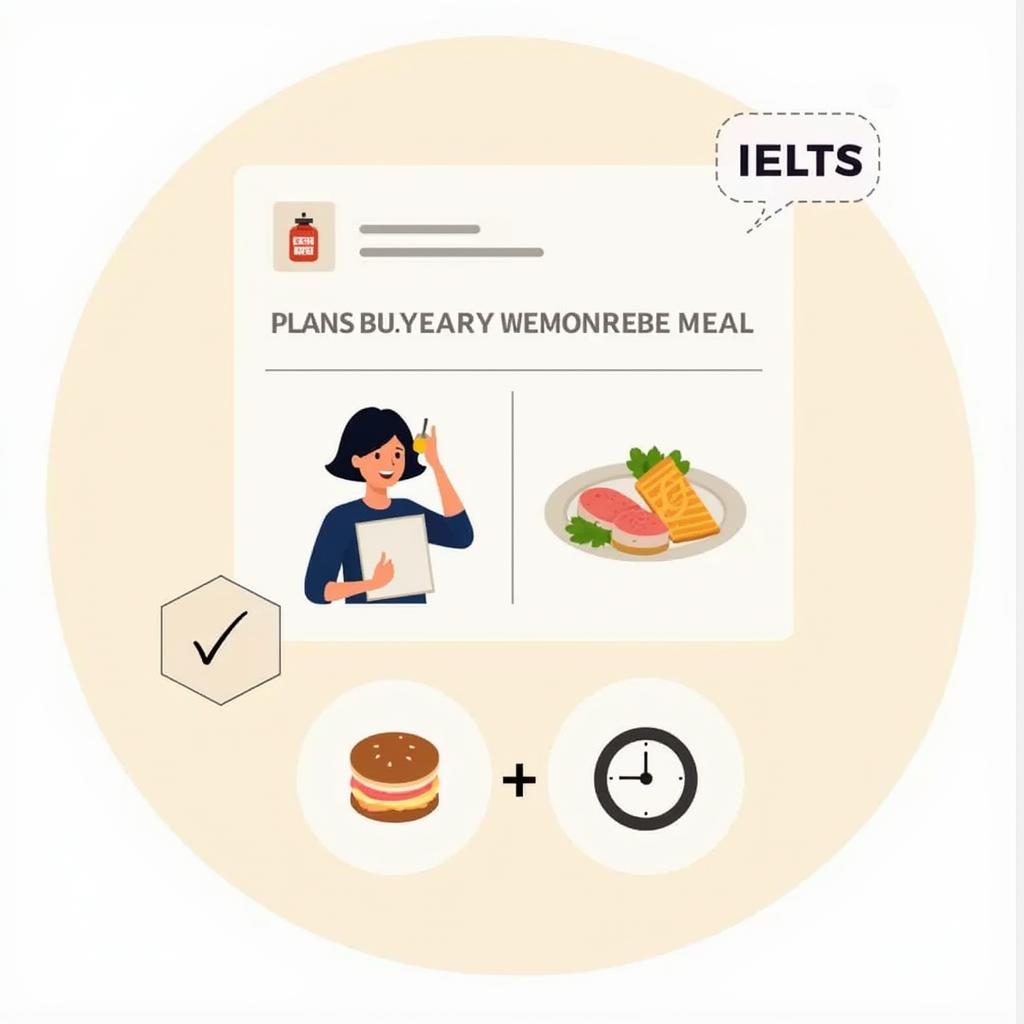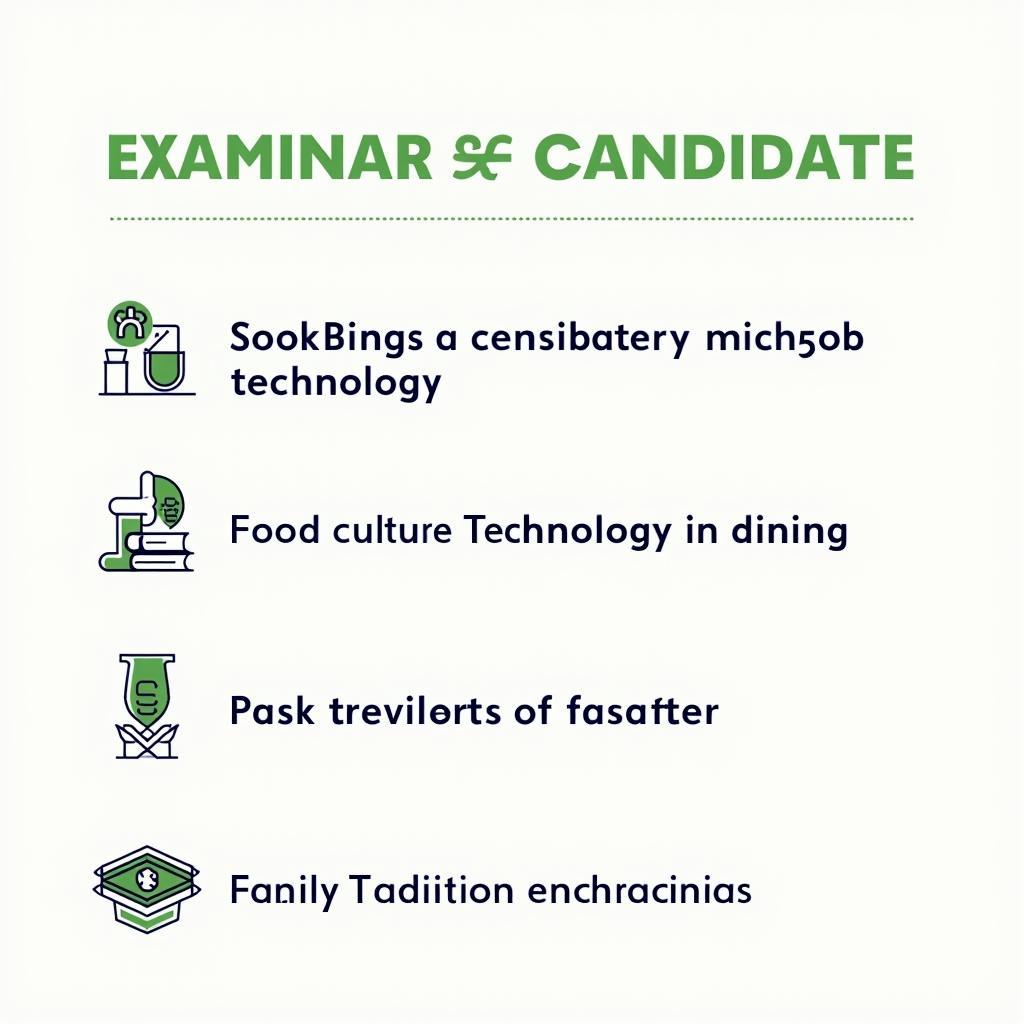Mở bài
Chủ đề “Describe A Memorable Meal You Shared With Someone Special” thuộc nhóm chủ đề Food, Relationships và Memorable experiences – cực kỳ phổ biến trong IELTS Speaking vì vừa kiểm tra khả năng kể chuyện mạch lạc (narrative), vừa đánh giá vốn từ về ẩm thực, cảm xúc, và mối quan hệ. Ở Part 1, bạn có thể gặp các câu hỏi khởi động xoay quanh thói quen ăn uống. Ở Part 2, cue card thường yêu cầu kể chi tiết trải nghiệm bữa ăn đáng nhớ. Sang Part 3, bạn sẽ thảo luận các vấn đề rộng hơn như văn hóa ăn uống, tác động của công nghệ lên thói quen dùng bữa.
Tần suất xuất hiện: Dựa trên tổng hợp từ ielts-blog, IELTS Liz, IELTS-Simon và các báo cáo đề thi gần đây, chủ đề này xuất hiện đều đặn trong giai đoạn 2019–2025 dưới nhiều biến thể (memorable meal, special occasion dinner, eating with family/friends). Dự đoán khả năng xuất hiện trong tương lai: Cao.
Bạn sẽ học được:
- Bộ câu hỏi thường gặp cho cả 3 Part theo đúng “hơi thở” đề thật
- Bài mẫu chi tiết cho nhiều band (6-7, 7.5-8, 8.5-9) kèm phân tích theo band descriptors
- Từ vựng và cụm từ ăn điểm, collocations và cách phát âm
- Chiến lược trả lời cho từng Part và lỗi thường gặp của thí sinh Việt Nam
- Góc nhìn người chấm: cách nâng band thực tế, tránh học thuộc máy móc
 Mẹo trả lời describe a memorable meal you shared with someone special trong IELTS Speaking
Mẹo trả lời describe a memorable meal you shared with someone special trong IELTS Speaking
IELTS Speaking Part 1: Introduction and Interview
Tổng Quan Về Part 1
- Thời gian: 4-5 phút
- Đặc điểm: Câu hỏi ngắn, đời sống hàng ngày
- Chiến lược: Trả lời trực tiếp, mở rộng 2-3 câu, thêm ví dụ nhanh
- Lỗi thường gặp của học viên Việt Nam:
- Trả lời quá ngắn (Yes/No)
- Chỉ dùng từ vựng cơ bản, lặp từ
- Thiếu chi tiết cụ thể, không có ví dụ
Các Câu Hỏi Thường Gặp
- Do you enjoy eating with other people or alone?
- How often do you have meals with your family?
- What kind of food do you usually eat on special occasions?
- Do you like cooking? Why or why not?
- What’s the most memorable meal you’ve had recently?
- Who do you usually share meals with?
- Do you prefer eating at home or eating out?
- Are there any traditional meals in your culture that you enjoy?
- How important is it to share meals with loved ones?
- Do you take photos of your food when you eat out?
Phân Tích và Gợi Ý Trả Lời Chi Tiết
—
Question: What’s the most memorable meal you’ve had recently?
Cách tiếp cận:
- Trả lời trực tiếp, nêu bữa ăn nào
- Mô tả nhanh: với ai, ở đâu, vì sao đáng nhớ
- Kết bằng cảm xúc/ý nghĩa rút ra
Sample Answer – Band 6-7:
It was a hotpot dinner with my parents last month. We tried a new place near our home, and the soup was really tasty. I felt relaxed because we hadn’t had time to eat together for ages.
Phân tích:
- Điểm mạnh: Trả lời trực tiếp, có bối cảnh thời gian/địa điểm, có cảm xúc.
- Hạn chế: Từ vựng đơn giản; ít collocations; câu đơn là chủ yếu.
- Tại sao Band 6-7: Đủ thông tin, khá mạch lạc nhưng chưa có từ vựng nâng cao hay cấu trúc phức.
Sample Answer – Band 8-9:
A memorable one was a cozy hotpot with my parents last month. Beyond the food, which was comforting and full-bodied, we finally had an unhurried conversation about my plans. It felt reassuring and brought us closer, which is why it stands out.
Phân tích:
- Điểm mạnh: Collocations giàu sắc thái (comforting, full-bodied, unhurried), ý sâu về mối quan hệ, kết nối cảm xúc.
- Tại sao Band 8-9: Fluency tự nhiên, từ vựng chính xác và linh hoạt, câu phức cân đối.
Key Vocabulary & Expressions:
- comforting: mang lại cảm giác dễ chịu, an ủi
- full-bodied (flavour): hương vị đậm đà
- unhurried conversation: cuộc trò chuyện không vội vã
- brought us closer: khiến chúng tôi gắn kết hơn
—
Question: Do you prefer eating at home or eating out?
Cách tiếp cận:
- Chọn một phía (hoặc cân bằng)
- Lý do 1-2 ý: sức khỏe, ngân sách, tiện lợi, trải nghiệm
- Ví dụ nhanh
Sample Answer – Band 6-7:
I usually prefer eating at home because it’s healthier and cheaper. I can control the ingredients and cook simple dishes like stir-fried vegetables and chicken.
Phân tích:
- Điểm mạnh: Lý do rõ, ví dụ cụ thể.
- Hạn chế: Thiếu chiều sâu và từ vựng tinh tế.
- Band 6-7: Hợp lý, mạch lạc nhưng còn đơn giản.
Sample Answer – Band 8-9:
Generally, I lean towards home-cooked meals because I can control portions and seasoning, but I do eat out for the social aspect and to broaden my palate. It’s a good balance for both health and enjoyment.
Phân tích:
- Điểm mạnh: Cân bằng quan điểm, collocations chuyên đề (control portions, social aspect, broaden my palate).
- Band 8-9: Ngôn ngữ linh hoạt, lập luận cân đối.
Key Vocabulary & Expressions:
- control portions/seasoning: kiểm soát khẩu phần/gia vị
- social aspect: khía cạnh xã hội
- broaden my palate: mở rộng khẩu vị, thử vị mới
—
Question: How important is it to share meals with loved ones?
Cách tiếp cận:
- Trả lời mức độ quan trọng
- Lý do: gắn kết, giảm stress, truyền thống
- Ví dụ xã hội/gia đình
Sample Answer – Band 6-7:
It’s quite important because people can talk and relax together. My family usually has dinner together on weekends, which makes us feel closer.
Phân tích:
- Điểm mạnh: Rõ, có ví dụ.
- Hạn chế: Từ vựng/ý tưởng cơ bản.
- Band 6-7: Đạt yêu cầu nhưng chưa nổi bật.
Sample Answer – Band 8-9:
It’s hugely important. Shared meals create rituals that strengthen relationships, and they’re often the only time families can slow down and check in with each other. That regular rhythm builds trust.
Phân tích:
- Điểm mạnh: Từ vựng trừu tượng (rituals, check in), lập luận sắc.
- Band 8-9: Rất tự nhiên, thuyết phục.
Key Vocabulary & Expressions:
- rituals: những nghi thức/thói quen mang tính gắn kết
- slow down: chậm lại
- check in (with someone): hỏi han, kết nối
IELTS Speaking Part 2: Long Turn (Cue Card)
Tổng Quan Về Part 2
- Thời gian chuẩn bị: 1 phút
- Thời gian nói: 2-3 phút
- Đặc điểm: Kể chuyện mạch lạc, đầy đủ bullet points
- Chiến lược:
- Ghi keyword, không viết câu
- Nói ít nhất 1.5-2 phút, có mở–thân–kết
- Dùng thì quá khứ; thêm cảm xúc, suy ngẫm, bài học
- Lỗi thường gặp:
- Nói dưới 1.5 phút
- Bỏ sót 1-2 bullet points
- Kể sự kiện khô, thiếu cảm xúc và chi tiết
Cue Card
Describe a memorable meal you shared with someone special
You should say:
- when and where it happened
- who you were with
- what you ate and drank
- and explain why it was memorable
Phân Tích Đề Bài
- Dạng câu hỏi: Describe an experience/event (kể về một trải nghiệm)
- Thì động từ: Quá khứ đơn, có thể xen quá khứ hoàn thành nếu cần
- Bullet points phải cover:
- Thời gian/địa điểm cụ thể
- Người đi cùng (vì sao “special”)
- Thức ăn/đồ uống nổi bật, vài tính từ vị giác
- Lý do đáng nhớ: cảm xúc, biến cố, ý nghĩa
- Câu “explain” quan trọng: Đây là phần ghi điểm cao – cần lý do sâu hơn ẩm thực, ví dụ: hòa giải, chia tay, kỷ niệm, thay đổi quan điểm, rút ra bài học.
Sample Answer – Band 6-7
Thời lượng: 1.5-2 phút
I’d like to talk about a dinner I had with my older sister about three months ago. It happened at a small family-run restaurant near our apartment. We don’t eat out together very often, so it felt special from the start.
We ordered a simple set: grilled chicken with rice, a vegetable soup, and iced tea. The food wasn’t fancy, but it was fresh and flavourful. I really liked the way the chicken was marinated; it was tender and juicy.
What made it memorable was the conversation. We discussed my future plans because I was going through a difficult time at university. She listened carefully and gave me some practical advice about time management and staying positive. After that meal, I felt more confident and relaxed. That’s why this dinner stands out in my mind.
Phân Tích Band Điểm
| Tiêu chí | Band | Nhận xét |
|---|---|---|
| Fluency & Coherence | 6-7 | Kể mạch lạc, có mở–thân–kết; ít do dự. |
| Lexical Resource | 6-7 | Từ vựng đủ dùng, vài tính từ vị giác (fresh, flavourful, tender). |
| Grammatical Range & Accuracy | 6-7 | Chủ yếu câu đơn, một số câu ghép; ít lỗi. |
| Pronunciation | 6-7 | Rõ ràng, dễ hiểu; ngữ điệu cơ bản. |
Điểm mạnh:
- Có bối cảnh, món ăn, cảm xúc, ý nghĩa
- Từ vựng vị giác đủ dùng
- Kết nối với sự thay đổi tâm trạng
Hạn chế:
- Chưa có cấu trúc phức tạp/idiomatic expressions
- Ý nghĩa chưa đào sâu; còn đơn giản
 Bài mẫu IELTS Speaking mô tả bữa ăn đáng nhớ cùng người đặc biệt
Bài mẫu IELTS Speaking mô tả bữa ăn đáng nhớ cùng người đặc biệt
Sample Answer – Band 7.5-8
Thời lượng: 2-2.5 phút
A meal that still lingers in my mind was a quiet birthday dinner I shared with my grandmother last spring at her apartment. She insisted on cooking, saying restaurant food couldn’t hold a candle to her home recipes, and she was absolutely right.
We had slow-braised pork, a light broth with seasonal greens, and a small plate of pickled vegetables. The flavours were perfectly balanced—rich yet not heavy—and the portions were modest, which suited her health-conscious approach. She poured jasmine tea and told me stories about how she learned to cook during stricter times, when ingredients were scarce.
It was memorable not just because the food was delicious, but because it felt like a passing of the torch. She showed me how to season by instinct, and we wrote down a few hand-me-down recipes together. By the end, I realized meals can carry family history and values, which made the evening truly special.
Phân Tích Band Điểm
| Tiêu chí | Band | Nhận xét |
|---|---|---|
| Fluency & Coherence | 7.5-8 | Kể chuyện mượt, chuyển ý tự nhiên; có cao trào cảm xúc. |
| Lexical Resource | 7.5-8 | Collocations giàu sắc thái (perfectly balanced, health-conscious), idioms nhẹ nhàng (passing of the torch). |
| Grammatical Range & Accuracy | 7.5-8 | Đa dạng câu phức, mệnh đề quan hệ; chính xác. |
| Pronunciation | 7.5-8 | Intonation tốt, nhấn nhá tự nhiên. |
So Sánh Với Band 6-7
| Khía cạnh | Band 6-7 | Band 7.5-8 |
|---|---|---|
| Vocabulary | fresh, flavourful, tender | slow-braised, perfectly balanced, health-conscious, passing of the torch |
| Grammar | Câu đơn/ghép cơ bản | Câu phức, non-defining clauses, mệnh đề quan hệ |
| Ideas | Ý nghĩa cơ bản (lời khuyên) | Tầng sâu văn hóa/gia đình (family history, values) |
Sample Answer – Band 8.5-9
Thời lượng: 2.5-3 phút
The most memorable meal I’ve ever shared with someone special took place on a rainy Sunday evening, at a tiny noodle shop tucked away in a back alley. I went there with my father, who rarely has time to sit down for a proper meal, and that alone set the tone for something out of the ordinary.
We ordered beef noodle soup. The broth was silky and aromatic, with layers of flavour—star anise, charred onion, and a hint of cinnamon—while the beef was meltingly tender. My father, who’s usually all business, slowed down. Between spoonfuls, he told me about the choices he’d made when he was my age: the risks he took, the mistakes he owned, and the quiet victories that no one saw. It felt like he was sharing a private archive.
What made it unforgettable was the emotional clarity that surfaced. Over a humble bowl of noodles, I finally understood the person behind the role of “Dad”. That shift—seeing him as an individual with vulnerabilities and grit—has stayed with me. Food was the backdrop, but the connection was the main course; that’s why this meal remains etched in my memory.
Phân Tích Band Điểm
| Tiêu chí | Band | Nhận xét |
|---|---|---|
| Fluency & Coherence | 8.5-9 | Trôi chảy, nhịp kể giàu hình ảnh, không do dự. |
| Lexical Resource | 8.5-9 | Từ vựng tinh vi, giàu sắc thái (silky, layers of flavour, private archive, emotional clarity). |
| Grammatical Range & Accuracy | 8.5-9 | Cấu trúc đa dạng, chính xác; nhịp câu linh hoạt. |
| Pronunciation | 8.5-9 | Tự nhiên, nhấn mạnh đúng trọng tâm, nhịp điệu giàu cảm xúc. |
Tại Sao Bài Này Xuất Sắc
- Fluency hoàn hảo: Kể tự nhiên, có cao trào, không ngập ngừng.
- Vocabulary tinh vi: private archive, emotional clarity, vulnerabilities and grit – giàu hình ảnh, chính xác ngữ cảnh.
- Grammar đa dạng: Mệnh đề quan hệ, cụm hiện tại phân từ, nhịp câu ngắn-dài đan xen.
- Ideas sâu sắc: Từ món ăn dẫn dắt tới nhận thức về con người/quan hệ – chiều sâu ý nghĩa.
Follow-up Questions (Rounding Off Questions)
Question 1: Do you often take photos of your food when you have a special meal?
- Band 6-7 Answer: Not really. I only take pictures if the presentation looks unique, like a beautifully decorated dessert.
- Band 8-9 Answer: Only occasionally. If the plating is striking or the meal marks a milestone, I’ll snap a photo as a keepsake, but I prefer being present at the table.
Question 2: Would you like to recreate that meal at home?
- Band 6-7 Answer: Yes, I’d like to try. I think the broth might be hard to make, though.
- Band 8-9 Answer: I would. The challenge is replicating the depth of the broth, but experimenting could be fun and would make the memory more tangible.
IELTS Speaking Part 3: Two-way Discussion
Tổng Quan Về Part 3
- Thời gian: 4-5 phút
- Đặc điểm: Thảo luận sâu, trừu tượng hơn
- Yêu cầu:
- Phân tích, so sánh, đánh giá, ví dụ xã hội
- Quan điểm cân bằng, thừa nhận tính phức tạp
- Chiến lược:
- Trả lời 3-5 câu
- Dùng discourse markers tự nhiên
- Dẫn chứng thực tế/văn hóa, không chỉ cá nhân
- Lỗi thường gặp:
- Trả lời ngắn, thiếu lập luận
- Lặp ý, thiếu từ vựng trừu tượng
- Không kiểm soát mạch nói
 Câu hỏi Part 3 về bữa ăn, văn hóa và xu hướng tương lai
Câu hỏi Part 3 về bữa ăn, văn hóa và xu hướng tương lai
Theme 1: Social and Cultural Impact of Shared Meals
Question 1: Why do shared meals play an important role in family life?
Phân tích:
- Dạng: Opinion
- Key words: shared meals, important role, family life
- Cách tiếp cận: Trả lời trực tiếp -> 2 lý do (bonding, communication/values) -> ví dụ/văn hóa
Sample Answer – Band 6-7:
Shared meals help families bond and communicate. People can talk about their day and solve small problems together. In many cultures, eating together is a tradition that keeps people close.
Phân tích:
- Structure: Rõ ràng nhưng cơ bản.
- Vocabulary: Adequate (bond, communicate), thiếu collocations nâng cao.
- Tại sao Band 6-7: Mạch lạc, đủ ý, nhưng không sâu.
Câu trả lời mẫu – Band 8-9:
They act as a social glue. Regular meals create predictable rituals where family members decompress, coordinate schedules, and transmit values, sometimes more effectively than formal conversations. Over time, that consistency compounds trust.
Phân tích:
- Structure: Trực tiếp → lý do + cơ chế → kết luận súc tích.
- Vocabulary: social glue, predictable rituals, decompress, compounds trust.
- Grammar: Câu phức, danh hóa, động từ cụ thể.
- Critical Thinking: Nhấn cơ chế (ritual, consistency).
Key Language Features:
- Discourse markers: Fundamentally, In practice, Over time
- Tentative language: to a great extent, arguably
- Abstract nouns: consistency, transmission (of values), cohesion
—
Question 2: Are traditional family meals disappearing in your country?
Phân tích:
- Dạng: Trend/Change
- Key words: traditional family meals, disappearing
- Cách tiếp cận: Thừa nhận xu hướng → nguyên nhân → ngoại lệ
Sample Answer – Band 6-7:
I think they are less common because people are busier and eat out more. However, during holidays, families still eat together.
Câu trả lời mẫu – Band 8-9:
To some extent, yes. Urban schedules and food delivery apps have made solo or staggered eating more common. That said, ritual-heavy occasions—like Lunar New Year—still anchor family meals, so the tradition is evolving rather than vanishing.
Key Language Features:
- evolving rather than vanishing: đang biến đổi, không biến mất
- anchor family meals: trở thành trụ cột gắn kết
Theme 2: Technology and Future Trends
Question 3: How has technology changed the way people share meals?
Phân tích:
- Dạng: Cause-Effect
- Key words: technology, changed, share meals
- Cách tiếp cận: Ảnh hưởng tích cực/tiêu cực → ví dụ
Sample Answer – Band 6-7:
Technology makes it easier to order food and eat together online. But phones can distract people at the table.
Câu trả lời mẫu – Band 8-9:
It’s a double-edged sword. On one hand, delivery platforms enable group meals without cooking; on the other, screens fragment attention, so presence at the table can suffer. Some families now set phone-free rules to protect that time.
—
Question 4: Do you think virtual dinners will become more popular in the future?
Phân tích:
- Dạng: Prediction
- Key words: virtual dinners, more popular
- Cách tiếp cận: Điều kiện → nhóm đối tượng → giới hạn
Sample Answer – Band 6-7:
Yes, especially for people living far away. But face-to-face meals are still better.
Câu trả lời mẫu – Band 8-9:
They’ll likely gain traction in long-distance relationships and remote teams, especially with better video and AR tools. Still, co-presence—sharing smells and textures—offers sensory cues that screens can’t replicate, so virtual meals will stay complementary, not dominant.
Theme 3: Cultural Differences and Values
Question 5: How do eating habits reflect cultural values?
Phân tích:
- Dạng: Explanation
- Key words: eating habits, reflect cultural values
- Cách tiếp cận: Nguyên tắc → ví dụ văn hóa A/B → kết luận
Sample Answer – Band 6-7:
Eating together shows respect for family in some cultures. In others, people value convenience and speed.
Câu trả lời mẫu – Band 8-9:
Eating habits are a mirror of values. For instance, shared dishes emphasize collectivism and reciprocity, whereas individualized portions can signal personal space and efficiency. Neither is superior; they solve different social needs.
—
Question 6: Should schools teach students about healthy eating and food culture?
Sample Answer – Band 6-7:
Yes, because it helps students eat better. They can learn about nutrition and traditional foods.
Câu trả lời mẫu – Band 8-9:
Absolutely. A good curriculum would blend nutrition literacy with food heritage, so students can make informed choices while appreciating cultural diversity. It’s a preventive approach to public health.
Key Language Features (Part 3 tổng hợp):
- Discourse markers: Fundamentally, In the long run, By contrast, To a degree
- Tentative language: I would argue, It seems to me, To some extent
- Abstract nouns: cohesion, heritage, literacy, reciprocity, co-presence, efficiency
4. Từ Vựng và Cụm Từ Quan Trọng
Topic-Specific Vocabulary
| Từ vựng/Cụm từ | Loại từ | Phiên âm | Nghĩa tiếng Việt | Ví dụ | Collocation |
|---|---|---|---|---|---|
| comforting | adj | /ˈkʌmfətɪŋ/ | mang lại sự dễ chịu | The soup was comforting on a rainy day. | comforting meal, comforting flavor |
| full-bodied | adj | /ˌfʊl ˈbɒdid/ | đậm đà, tròn vị | The broth was full-bodied and rich. | full-bodied broth, full-bodied flavor |
| unhurried | adj | /ʌnˈhʌrid/ | không vội vã | We had an unhurried conversation. | unhurried pace, unhurried meal |
| marinated | adj | /ˈmærɪneɪtɪd/ | được ướp | The marinated chicken was tender. | marinated pork/chicken, marinated tofu |
| tender | adj | /ˈtendə/ | mềm | The beef was meltingly tender. | tender meat, tender texture |
| broth | n | /brɒθ/ | nước dùng | The broth had layers of flavour. | chicken broth, rich broth |
| pickled | adj | /ˈpɪkəld/ | muối chua | We had pickled vegetables. | pickled carrots, pickled cabbage |
| well-balanced | adj | /ˌwel ˈbælənst/ | cân bằng (hương vị) | The dish was well-balanced. | well-balanced flavors/diet |
| health-conscious | adj | /ˈhelθ ˌkɒnʃəs/ | chú trọng sức khỏe | She’s quite health-conscious. | health-conscious choices |
| palate | n | /ˈpælət/ | khẩu vị | I want to broaden my palate. | refine one’s palate |
| social glue | n | /ˈsəʊʃl ɡluː/ | chất keo gắn kết xã hội | Shared meals are social glue. | act as social glue |
| decompress | v | /ˌdiːkəmˈpres/ | giải tỏa căng thẳng | Families decompress over dinner. | decompress after work |
| anchor (v) | v | /ˈæŋkə/ | neo giữ, làm trụ cột | Festivals anchor family meals. | anchor tradition, anchor routines |
| replicate | v | /ˈreplɪkeɪt/ | tái tạo | It’s hard to replicate the broth. | replicate results/flavors |
| keepsake | n | /ˈkiːpseɪk/ | kỷ vật | I kept the photo as a keepsake. | special keepsake |
| hand-me-down | adj/n | /ˌhænd mi ˈdaʊn/ | truyền lại (đồ/đơn) | hand-me-down recipes from grandma | hand-me-down recipe/clothes |
| passing of the torch | n | /ˈtɔːtʃ/ | trao truyền thế hệ | It felt like a passing of the torch. | symbolic passing of the torch |
| sensory cues | n | /ˈsensəri kjuːz/ | tín hiệu giác quan | Screens can’t provide sensory cues. | rich sensory cues |
| co-presence | n | /ˌkəʊ ˈprezns/ | hiện diện cùng nhau | Co-presence matters at the table. | meaningful co-presence |
| layers of flavour | n | /ˈleɪəz əv ˈfleɪvə/ | nhiều tầng hương vị | The broth had layers of flavour. | deep layers of flavour |
Idiomatic Expressions & Advanced Phrases
| Cụm từ | Nghĩa | Ví dụ sử dụng | Band điểm |
|---|---|---|---|
| hold a candle to | sánh được với | Restaurant food can’t hold a candle to her cooking. | 7.5-9 |
| passing of the torch | trao truyền | It felt like a passing of the torch between generations. | 7.5-9 |
| broaden my palate | mở rộng khẩu vị | I eat out to broaden my palate. | 7.5-9 |
| social glue | chất keo xã hội | Shared meals are social glue for families. | 7.5-9 |
| double-edged sword | con dao hai lưỡi | Tech at the table is a double-edged sword. | 7.5-9 |
| to gain traction | dần phổ biến | Virtual dinners may gain traction. | 7.5-9 |
| evolving rather than vanishing | biến đổi chứ không biến mất | Traditions are evolving rather than vanishing. | 7.5-9 |
| to check in with someone | hỏi han, kết nối | Mealtimes help us check in with each other. | 7.5-9 |
| to compound trust | bồi đắp niềm tin theo thời gian | Regular rituals compound trust. | 7.5-9 |
| private archive | “kho” ký ức riêng | He shared a private archive of stories. | 8-9 |
Discourse Markers (Từ Nối Ý Trong Speaking)
Để bắt đầu câu trả lời:
- Well,…
- Actually,…
- To be honest,…
- I’d say that…
Để bổ sung ý:
- On top of that,…
- What’s more,…
- Not to mention…
Để đưa ra quan điểm cân bằng:
- On the one hand,… On the other hand,…
- While it’s true that…, we also need to consider…
Để kết luận:
- All in all,…
- At the end of the day,…
Grammatical Structures Ấn Tượng
- Conditional Sentences
- Mixed conditional: If I hadn’t learnt those recipes, I wouldn’t be cooking confidently now.
- Inversion: Had I known the place was that good, I would have booked earlier.
- Relative Clauses
- Non-defining: My grandmother, who cooks by instinct, never measures anything.
- Passive Voice
- It is said that the broth should be simmered for hours to develop depth.
- Cleft Sentences
- What I find most memorable is the way the meal brought us closer.
- The thing that made it special was the unhurried conversation.
Chiến lược đạt Band cao từ góc nhìn của người chấm – Examiner
4 Tiêu Chí Chấm Điểm IELTS Speaking
- Fluency and Coherence (25%)
- Band 6-7: Trôi chảy tương đối, đôi khi ngập ngừng
- Band 8-9: Nhịp nói tự nhiên, mạch lạc, kiểm soát tốt thời gian
Cách cải thiện:
- Luyện nói hàng ngày, thu âm và tự chấm theo 4 tiêu chí
- Dùng từ nối tự nhiên, tránh liệt kê khô
- Không học thuộc – rất dễ bị nhận ra
- Lexical Resource (25%)
- Band 6-7: Đủ từ vựng chủ đề, paraphrase cơ bản
- Band 8-9: Linh hoạt, chính xác, có idiomaticity
Cách cải thiện:
- Học theo cụm/collocations; tạo sổ tay topic Food & Relationships
- Paraphrase liên tục để tránh lặp từ “good, delicious, nice”
- Dùng từ nâng cao đúng chỗ, không “nhồi”
- Grammatical Range and Accuracy (25%)
- Band 6-7: Pha trộn câu đơn/câu ghép, có lỗi nhỏ
- Band 8-9: Cấu trúc đa dạng, kiểm soát thì và mệnh đề tốt
Cách cải thiện:
- Chủ động dùng 2-3 cấu trúc cao (non-defining relative clauses, cleft sentences, conditionals)
- Tự sửa lỗi khi nhận ra – thể hiện awareness
- Pronunciation (25%)
- Band 6-7: Rõ, có lỗi nhịp/nhấn
- Band 8-9: Intonation linh hoạt, trọng âm từ/câu tốt
Cách cải thiện:
- Shadowing 10 phút/ngày; chọn nguồn có nhịp tự nhiên
- Tập nhấn nội dung mang thông tin mới trong câu
- Ghi âm so sánh trước–sau để thấy tiến bộ
Những Điều Examiner Muốn Thấy
DO – Nên làm:
- Trả lời trực tiếp, rồi mở rộng bằng lý do + ví dụ
- Minh họa bằng trải nghiệm thật hoặc quan sát xã hội
- Thể hiện góc nhìn cá nhân, không rập khuôn
- Tự tin, giữ eye contact, mỉm cười tự nhiên
- Tự sửa lỗi nhẹ nếu phát hiện
- Hỏi lại khi chưa rõ câu hỏi
- Tốc độ vừa phải, ngắt nghỉ hợp lý
DON’T – Không nên:
- Học thuộc lòng bài mẫu – examiner nhận ra ngay
- Dùng template cứng nhắc cho mọi đề
- Trả lời cụt ngủn, thiếu phân tích
- Nói quá nhanh hoặc chậm
- Im lặng quá 3 giây nếu bí – hãy paraphrase để “câu giờ”
- Nói sai thông tin cá nhân rồi bị “bắt bài”
- Ám ảnh lỗi ngữ pháp đến mức mất tự nhiên – ưu tiên fluency
[internal_link: Luyện nói IELTS Speaking chủ đề Food: Collocations và Idioms thông dụng]
Kết luận
Chủ đề describe a memorable meal you shared with someone special là “miếng bánh ngon” để bạn thể hiện kể chuyện mạch lạc, vốn từ về ẩm thực và chiều sâu cảm xúc – những yếu tố khiến examiner đánh giá cao. Hãy luyện cách ghi chú thông minh trong 1 phút, dùng cấu trúc linh hoạt và khai thác ý nghĩa phía sau bữa ăn: sự gắn kết, ký ức gia đình, hay một bước ngoặt cá nhân. Khi bạn nói tự nhiên, có chiều sâu và dùng từ chính xác, band điểm sẽ tăng một cách bền vững.


